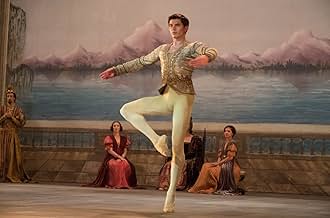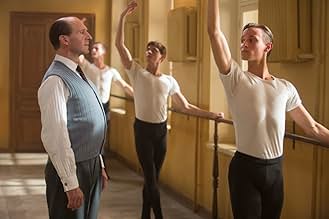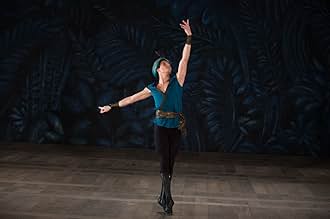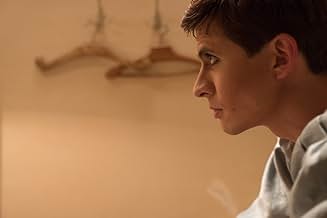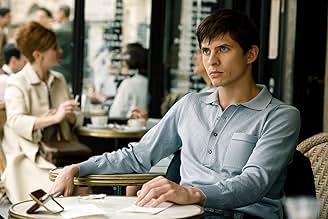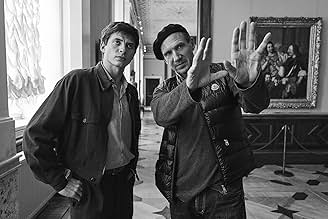CALIFICACIÓN DE IMDb
6.6/10
7.3 k
TU CALIFICACIÓN
La historia de cómo el bailarín Rudolf Nureyev desertó de la Unión Soviética por Occidente.La historia de cómo el bailarín Rudolf Nureyev desertó de la Unión Soviética por Occidente.La historia de cómo el bailarín Rudolf Nureyev desertó de la Unión Soviética por Occidente.
- Premios
- 1 premio ganado y 4 nominaciones en total
- Dirección
- Guionistas
- Todo el elenco y el equipo
- Producción, taquilla y más en IMDbPro
Opiniones destacadas
The film's title derives from the Russian phrase "belaya vorona", or "white crow", meaning an outsider or nonconformist, a person who stands out from his or her contemporaries in the way that a white crow would stand out from its black fellows. The "white crow" of this film is the Russian ballet dancer Rudolf Nureyev, a man who had difficulty conforming to the official Soviet system, either in his artistic life or in his personal life. (He was gay at a time when this was neither lawful nor acceptable in Soviet society).
Nureyev shocked the world of ballet when he defected to the West at Le Bourget airport, Paris, in 1961, and the film is built around this incident. His decision to defect was, apparently, a spontaneous one, taken when the Communist authorities, irritated by the fact that he had spent much of his time in Paris in the company of Western intellectuals and concerned by rumours that he had been seen in a gay bar, decided to send him back to Russia rather than allowing him to travel with the Kirov ballet to London, the next leg of their tour. Scenes of Nureyev's stay in Paris are intercut with flashbacks to his poverty-stricken wartime childhood in the provincial city of Ufa and to his time as a ballet student in Leningrad, as St Petersburg was then known.
The film was directed by the well-known British actor Ralph Fiennes, clearly a ballet enthusiast. Fiennes also takes an acting role as Alexander Pushkin- not, of course, the classic Russian author but Nureyev's tutor at the Kirov Ballet. This was, I felt, one of two outstanding performances in the film. Pushkin emerges not only as a visionary who spotted Nureyev's talent when many did not but also as a sympathetic father-figure who provided the young dancer with a kindness and understanding that was otherwise lacking in the rigid, inflexible Soviet system. The other great performance, of course, comes from the young Oleg Ivenko as the conflicted Nureyev himself. On the one hand he is held by a love of his Russian homeland, the land which contains all he knows and all that he has held dear- his family, his friends and his mentor Pushkin. On the other hand, he is drawn towards the West, not only because of the greater intellectual freedom which it offers but also because of a feeling that it is only there that he can fully realise himself as a dancer.
I must admit that I am not a great balletomane myself; I have been to the ballet on only a handful of occasions in my life, and never saw Nureyev dance except on television. Yet there are some films which have been good enough able to hold my attention even though they are centred upon activities in which I would normally take little interest. Like most Britons, I know little about baseball, yet I was enthralled by "Eight Men Out" and "Field of Dreams". I probably know even less about wrestling, but that did not prevent me from admiring the more recent "Foxcatcher". "White Crow" comes into the same category. Those who love ballet will doubtless be enthralled by it. Even those of us who do not will be able to see enough in this movie to understand the enthusiasm of those who do. And both groups will join together in their appreciation of the human drama which lies at the heart of Rudolf Nureyev's story. 8/10
Nureyev shocked the world of ballet when he defected to the West at Le Bourget airport, Paris, in 1961, and the film is built around this incident. His decision to defect was, apparently, a spontaneous one, taken when the Communist authorities, irritated by the fact that he had spent much of his time in Paris in the company of Western intellectuals and concerned by rumours that he had been seen in a gay bar, decided to send him back to Russia rather than allowing him to travel with the Kirov ballet to London, the next leg of their tour. Scenes of Nureyev's stay in Paris are intercut with flashbacks to his poverty-stricken wartime childhood in the provincial city of Ufa and to his time as a ballet student in Leningrad, as St Petersburg was then known.
The film was directed by the well-known British actor Ralph Fiennes, clearly a ballet enthusiast. Fiennes also takes an acting role as Alexander Pushkin- not, of course, the classic Russian author but Nureyev's tutor at the Kirov Ballet. This was, I felt, one of two outstanding performances in the film. Pushkin emerges not only as a visionary who spotted Nureyev's talent when many did not but also as a sympathetic father-figure who provided the young dancer with a kindness and understanding that was otherwise lacking in the rigid, inflexible Soviet system. The other great performance, of course, comes from the young Oleg Ivenko as the conflicted Nureyev himself. On the one hand he is held by a love of his Russian homeland, the land which contains all he knows and all that he has held dear- his family, his friends and his mentor Pushkin. On the other hand, he is drawn towards the West, not only because of the greater intellectual freedom which it offers but also because of a feeling that it is only there that he can fully realise himself as a dancer.
I must admit that I am not a great balletomane myself; I have been to the ballet on only a handful of occasions in my life, and never saw Nureyev dance except on television. Yet there are some films which have been good enough able to hold my attention even though they are centred upon activities in which I would normally take little interest. Like most Britons, I know little about baseball, yet I was enthralled by "Eight Men Out" and "Field of Dreams". I probably know even less about wrestling, but that did not prevent me from admiring the more recent "Foxcatcher". "White Crow" comes into the same category. Those who love ballet will doubtless be enthralled by it. Even those of us who do not will be able to see enough in this movie to understand the enthusiasm of those who do. And both groups will join together in their appreciation of the human drama which lies at the heart of Rudolf Nureyev's story. 8/10
Based on the life of Rudolf Nureyev (portrayed by Oleg Ivenko): in different time segments, the life of the ballet great is depicted during his childhood in rural Eastern Russia; his late teen years training in Leningrad (now St. Petersburg); and the Kirov Ballet tour in Paris of 1961 during which Nureyev made a decision that changed his life significantly. The film is based on the novel "Rudolf Nureyev: A Life" by Julie Kavanaugh and is a British/French/Serbian co-production spoken in Russian, French, and English.
One of the enjoyable aspects of the film is following the young man's transition from a rural area into cities as grand as Leningrad and Paris and his awestruck fascination with the visual arts at his disposal. This can easily remind many viewers of their first travel experiences and having felt the same elation.
The three different time sequences are done concurrently which is sometimes jarring and unnecessary. The film would probably have been better if done chronologically with only occasional flashbacks.
Around the halfway mark of the film, Nureyev is showing a lot of irritability in a restaurant scene. It is at this mark that the viewer could feel equally irritated after having had enough of the frequent timeline changes and the film's reduced energy by that point. Also in that scene, while Nureyev is showing a strong reaction to class prejudice from other Russians, there was little to indicate this problem in earlier scenes. His rudeness seems to come out of nowhere.
Despite these criticisms, it is all worth it for the extended climactic scene at Paris' Le Bourget Airport (very well re-constructed to resemble its appearance in the early 1960s). Much like the final airport scene in "Argo", the one here has suspense, tension, and mystery even if the outcome is already well known.
"The White Crow" is a fine tribute to an artistic icon and a good depiction of the life of a genius in a restrictive, Communist country although it would have benefited to explore more on another restriction in Rudolf's life under Communisim - his homosexuality. Considering the film concluded when its subject was still very young, it is tempting to encourage a sequel for the remainder of such a very unique life of an extremely rare individual who radically changed fate for his own life and that of the ballet world. - dbamateurcritic
One of the enjoyable aspects of the film is following the young man's transition from a rural area into cities as grand as Leningrad and Paris and his awestruck fascination with the visual arts at his disposal. This can easily remind many viewers of their first travel experiences and having felt the same elation.
The three different time sequences are done concurrently which is sometimes jarring and unnecessary. The film would probably have been better if done chronologically with only occasional flashbacks.
Around the halfway mark of the film, Nureyev is showing a lot of irritability in a restaurant scene. It is at this mark that the viewer could feel equally irritated after having had enough of the frequent timeline changes and the film's reduced energy by that point. Also in that scene, while Nureyev is showing a strong reaction to class prejudice from other Russians, there was little to indicate this problem in earlier scenes. His rudeness seems to come out of nowhere.
Despite these criticisms, it is all worth it for the extended climactic scene at Paris' Le Bourget Airport (very well re-constructed to resemble its appearance in the early 1960s). Much like the final airport scene in "Argo", the one here has suspense, tension, and mystery even if the outcome is already well known.
"The White Crow" is a fine tribute to an artistic icon and a good depiction of the life of a genius in a restrictive, Communist country although it would have benefited to explore more on another restriction in Rudolf's life under Communisim - his homosexuality. Considering the film concluded when its subject was still very young, it is tempting to encourage a sequel for the remainder of such a very unique life of an extremely rare individual who radically changed fate for his own life and that of the ballet world. - dbamateurcritic
First-time actor Oleg Ivenko gives a strong performance here in the lead role of renowned ballet dancer Rudolf Nureyev. The biopic also has a most solid supporting cast and is directed by the fine actor Ralph Fiennes (who also has a supporting role in the film), and is written by the most talented David Hare, based on the book by Julie Kavanagh.
The biopic covers the early years of Nureyev from his most difficult early life in the Soviet Union, his incredible innate talent for ballet dancing, his complicated and flamboyant personality, love of the arts, and a most fervent desire for freedom.
I felt the heart of the movie was the tension filled final 20 minutes or so of Nureyev's defection to the West at a Paris airport, in 1961.He would be the first Soviet notable to do so during the Cold War.
All in all, although this biopic is deliberately paced and a little too long at over 2 hours in length I felt it was a solid effort all around. To note, Rudolph Nureyev would pass away in 1993 from AIDS, at the age of 54.
The biopic covers the early years of Nureyev from his most difficult early life in the Soviet Union, his incredible innate talent for ballet dancing, his complicated and flamboyant personality, love of the arts, and a most fervent desire for freedom.
I felt the heart of the movie was the tension filled final 20 minutes or so of Nureyev's defection to the West at a Paris airport, in 1961.He would be the first Soviet notable to do so during the Cold War.
All in all, although this biopic is deliberately paced and a little too long at over 2 hours in length I felt it was a solid effort all around. To note, Rudolph Nureyev would pass away in 1993 from AIDS, at the age of 54.
A 'white crow' in the Russian idiom is someone who stands out from others because of their appearance or behaviour. Rudolph Nureyev was, and for many still is, the white crow in the world of male ballet dancers. With extraordinary athleticism and sharply chiselled features, he defied gravity and glamorised male dancing. He also managed to make the KGB look flatfooted when he famously defected to the West.
We first see the young Rudolph as a six-year old child prodigy plucked from a poor background. The film flashes-back to these early scenes several times to remind viewers that despite his majestic aura on stage, he came from humble origins. The adult Rudolph (Oleg Ivenko) was a volatile personality both on and off stage. KGB spies watched elite dancers closely because ballet was a major cultural propaganda tool at the height of the Cold War. Rudolph was known to praise creative freedoms in the West and his secret sexuality was seen as a potential source of political embarrassment.
Most of the film builds the context in which Rudolph would commit what Russians believed was the ultimate act of treason. Barely enough camera time is devoted to his ballet lessons and performances, but what is shown will please devotees of the artform. A major sub-narrative is the live-in mentoring by his teacher Pushkin (Ralph Fiennes) and his relationships with Pushkin's wife Xenia (Chulpan Khamatova) and socialite Clara Saint (Adele Exarchopoulos). Rather than meaningful affairs, these relationships show Rudolph's willingness to exploit anyone who could advance his dancing career.
The film's modest tension curve spikes a few times during Rudolph's fiery temper tantrums, but it jumps steeply during the climactic defection scenes. The camera almost neurotically switches from close-ups on the faces of Russian spies, American observers, Rudolph and Clara, all while in the transit area of a French airport. When Rudolph is stopped from boarding a flight to his next performance, the KGB falsely tell him he has been summoned to a gala performance for the Kremlin. He is thrust into a vortex of disbelief, terror, and the realisation that if he seeks political asylum he will never set foot again in his homeland nor see his family.
Despite its uneven pace and meandering narrative arc, this powerful non-fiction storytelling is backed up with excellent acting performances and cinematography. The Cold War tensions are palpable and the political battle lines drawn clearly. You do not need to be a ballet fan to appreciate this film.
Director: Ralph Fiennes Stars: Oleg Ivenko, Ralph Fiennes, Adele Exarchopoulos, Chulpan Khamatova
We first see the young Rudolph as a six-year old child prodigy plucked from a poor background. The film flashes-back to these early scenes several times to remind viewers that despite his majestic aura on stage, he came from humble origins. The adult Rudolph (Oleg Ivenko) was a volatile personality both on and off stage. KGB spies watched elite dancers closely because ballet was a major cultural propaganda tool at the height of the Cold War. Rudolph was known to praise creative freedoms in the West and his secret sexuality was seen as a potential source of political embarrassment.
Most of the film builds the context in which Rudolph would commit what Russians believed was the ultimate act of treason. Barely enough camera time is devoted to his ballet lessons and performances, but what is shown will please devotees of the artform. A major sub-narrative is the live-in mentoring by his teacher Pushkin (Ralph Fiennes) and his relationships with Pushkin's wife Xenia (Chulpan Khamatova) and socialite Clara Saint (Adele Exarchopoulos). Rather than meaningful affairs, these relationships show Rudolph's willingness to exploit anyone who could advance his dancing career.
The film's modest tension curve spikes a few times during Rudolph's fiery temper tantrums, but it jumps steeply during the climactic defection scenes. The camera almost neurotically switches from close-ups on the faces of Russian spies, American observers, Rudolph and Clara, all while in the transit area of a French airport. When Rudolph is stopped from boarding a flight to his next performance, the KGB falsely tell him he has been summoned to a gala performance for the Kremlin. He is thrust into a vortex of disbelief, terror, and the realisation that if he seeks political asylum he will never set foot again in his homeland nor see his family.
Despite its uneven pace and meandering narrative arc, this powerful non-fiction storytelling is backed up with excellent acting performances and cinematography. The Cold War tensions are palpable and the political battle lines drawn clearly. You do not need to be a ballet fan to appreciate this film.
Director: Ralph Fiennes Stars: Oleg Ivenko, Ralph Fiennes, Adele Exarchopoulos, Chulpan Khamatova
This film tells the story of a Russian ballet dancer who defected in France during the cold war.
I can't quite believe how good this film is. The story is intense and captivating, even if you don't know about Rudi or about ballet. The dances portrayed are beautiful, the leading actors are great to look at too. The airport scene is so intense that I watched it several times. I also particularly like the fact that Clara Sant helped Rudi so much, without expecting anything in return. I enjoyed every bit of this film, and I strongly recommend it.
I can't quite believe how good this film is. The story is intense and captivating, even if you don't know about Rudi or about ballet. The dances portrayed are beautiful, the leading actors are great to look at too. The airport scene is so intense that I watched it several times. I also particularly like the fact that Clara Sant helped Rudi so much, without expecting anything in return. I enjoyed every bit of this film, and I strongly recommend it.
¿Sabías que…?
- TriviaHayden Christensen, who trained extensively in ballet as a child, was first choice to star; however a persistent ankle injury prevented him from being able to perform to the standards demanded by Ralph Fiennes.
- ErroresIn a scene showing a close up of Nureyev's foot performing a tendu, the shoe he is wearing is a white split sole ballet slipper, a shoe that did not exist in the 1960s. Split sole ballet technique shoes have only been on the dance scene since the mid 1990s.
- Citas
Claire Motte: You are with the company? Did you dance tonight?
Rudolf Nureyev: If I had danced, you would remember.
- ConexionesFeatured in Ralph Fiennes & Oleg Ivenko in Conversation (2019)
- Bandas sonorasLa Bayadère 3rd Shade Variation
Composed by Ludwig Minkus
Arranged by Matthias Gohl
Performed by Ilan Eshkeri and The London Metropolitan Orchestra
Selecciones populares
Inicia sesión para calificar y agrega a la lista de videos para obtener recomendaciones personalizadas
- How long is The White Crow?Con tecnología de Alexa
Detalles
- Fecha de lanzamiento
- Países de origen
- Sitios oficiales
- Idiomas
- También se conoce como
- Beyaz Karga
- Locaciones de filmación
- Productoras
- Ver más créditos de la compañía en IMDbPro
Taquilla
- Total en EE. UU. y Canadá
- USD 1,828,784
- Fin de semana de estreno en EE. UU. y Canadá
- USD 78,782
- 28 abr 2019
- Total a nivel mundial
- USD 7,622,595
- Tiempo de ejecución2 horas 7 minutos
- Color
- Relación de aspecto
- 1.85 : 1
Contribuir a esta página
Sugiere una edición o agrega el contenido que falta

Principales brechas de datos
By what name was The White Crow (2018) officially released in India in English?
Responda





